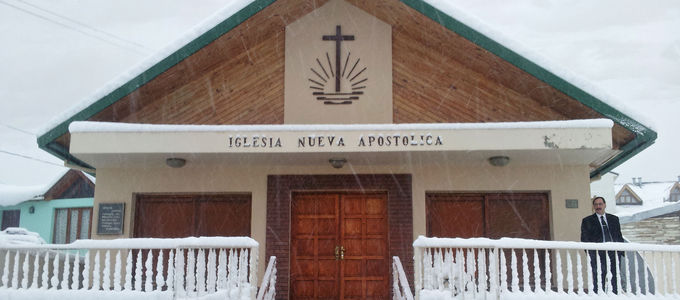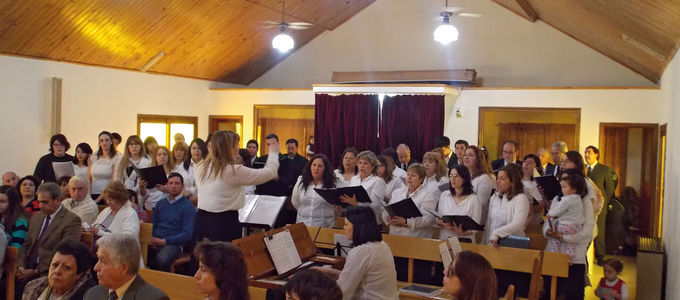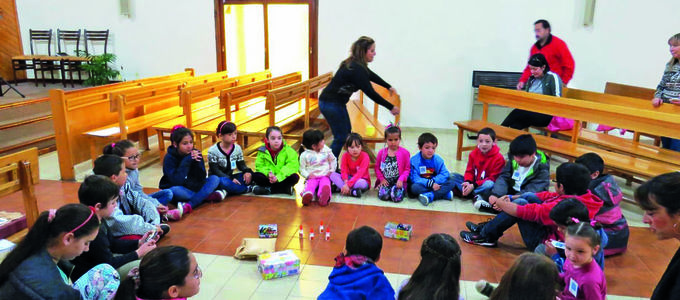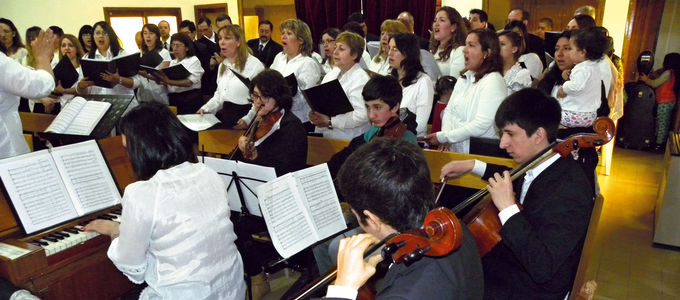
She is remote and rather isolated. Apart from snow-covered mountain peaks, there is not much else around. We are talking about the southernmost New Apostolic congregation in the world: Ushuaia.
The city is situated at the southern extremity of the South American mainland, at the tip of the Argentinian province of Tierra del Fuego. Some would call this the end of the world—depending on the perspective. The temperatures throughout the year are fairly cold, and it is wet. In the winter month of July the thermometer can drop to minus 21 degrees Celsius. And there is plenty of snow in winter so that the city is often covered in a white blanket.
Congregational life in Ushuaia is everything but chilly. The services are usually attended by 50 to 60 members; on special occasions this number increases anywhere to 90 people. Priest Miguel Ángel Mustto, the rector, receives help from three Priests, three Deacons, and several other volunteers. The congregation has a 25-member choir, and one that does not have to hide. Proof of this is the fact that the choir regularly gives concerts at Christmas.
All age groups are active
The rector, Priest Mussto, does not have to worry about there not being enough young blood in this remote place. He has a budding congregation. There are 13 young adults and 28 children, who not only take part in the divine services but also in the various congregational activities.
For Yanina Albarracín the climate is not an issue at all. “I grew up here, I don’t know anything else,” she says. Yanina is 25 years old. She is a teacher and works with children who have disabilities. Yanina’s teaching abilities also come in very handy in church. On Sundays she teaches Sunday School in her congregation. She also knows Sign Language and sometimes drives 30 kilometres to interpret for a young deaf New Apostolic woman.
Following his role model, his grandfather
And then there is young Kevin Natanahel Núñez. He is 14 and very active in the congregation. He helps clear the snow on the church property, does door duty, distributes Church magazines, and plays the guitar or the flute in the congregation’s ensemble. “I saw how my grandfather helped along in the congregation, and I knew that that was what I wanted to do too.”
The beginnings in Ushuaia go back to 1966, when several New Apostolic people moved to Ushuaia temporarily for professional reasons. In 1971 a New Apostolic family from Punta Alta actually settled in Ushuaia. They received pastoral care letters. Over the course of the years, further families settled in Ushuaia, and in 1983 Oscar Jerez, a Priest, moved there with his family. He regularly conducted services in the homes of the members.
A great deal in common with other congregations
In 1986 the congregation had grown to a point where new premises were needed. A small house was bought a little later in which the members gathered for divine services until the church was built and dedicated.
“I really feel at home here,” one of the pioneers, a retired Priest, says. “Even though Ushuaia is so remote, the fact remains that the same Spirit is active here as in all the other congregations around the world.”
From the history of the congregation
9 January 1993: Dedication of the church by District Apostle Mario Fiore.
7 September 2002: First joint regional meeting in Ushuaia for the southern part of the District Apostle Area. Four hundred members attended the service by District Apostle Mario Fiore.
7 November 2006: Chief Apostle Wilhelm Leber visits Ushuaia. In his company are District Apostles from Germany, South Africa, and Brazil, and District Apostle Norberto Batista from Argentina.
28 October 2012: District Apostle Norberto Passuni conducts a service in Ushuaia.
31 January 2016: District Apostle Enrique Minio visits Ushuaia the first time as a District Apostle. As a Bishop, he looked after the brothers and sisters in the region for over ten years.
















